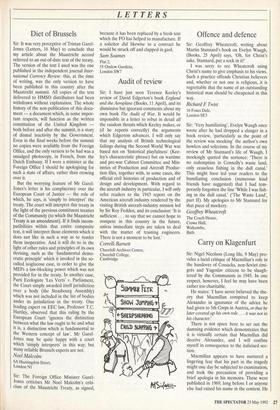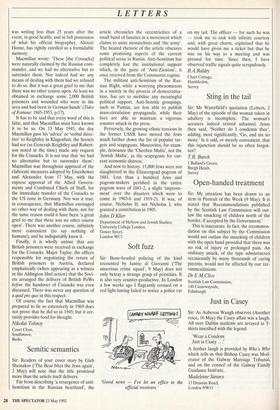Carry on Klagenfurt
Sir: Nigel Nicolson (Long life, 9 May) pro- vides a lucid critique of Macmillan's role in the handover of Cossacks, non-Soviet émi- grés and Yugoslav citizens to be slaugh- tered by the Communists in 1945. In one respect, however, I feel he may have been rather too charitable.
He states: 'I have never believed the the- ory that Macmillan conspired to keep Alexander in ignorance of the advice he had given to 5th Corps in Austria, or that he later covered up his own role . . . it was not in his character.'
There is not space here to set out the damning evidence which demonstrates that it is virtually certain that Macmillan did deceive Alexander, and I will confine myself in consequence to the italicised sec- tion.
Macmillan appears to have nurtured a lingering fear that his part in the tragedy might one day be subjected to examination, and took the precaution of providing a brief apologia in his memoirs. These were published in 1969, long before I or anyone else had raised his name in the context. He
LETTERS
was writing less than 25 years after the event, in good health, and in full possession of what his official biographer, Alistair Home, has rightly extolled as a formidable memory.
Macmillan wrote: 'These [the Cossacks] were naturally claimed by the Russian com- mander, and we had no alternative but to surrender them. Nor indeed had we any means of dealing with them had we refused to do so. But it was a great grief to me that there was no other course open. At least we obtained in exchange some 2,000 British prisoners and wounded who were in the area and had been in German hands' (Tides of Fortune: 1945-1955, p.17).
It has to be said that every word of this is false, and that Macmillan must have known it to be so. On 13 May 1945, the day Macmillan gave his 'advice' or 'verbal direc- tive' to Keightley in Klagenfurt, the Soviets had not (as Generals Keightley and Robert- son noted at the time) made any request for the Cossacks. It is not true that 'we had no alternative but to surrender them': Macmillan was throughout apprised of the elaborate measures adopted by Eisenhower and Alexander from 17 May, with the express approval of the Allied Govern- ments and Combined Chiefs of Staff, for the immediate transfer of the Cossacks to the US zone in Germany. Nor was it true, in consequence, that Macmillan envisaged no other way of dealing with them, nor for the same reason could it have been 'a great grief to me that there was no other course open'. There was another course, infinitely more convenient (to say nothing of humane), and he indisputably knew it.
Finally, it is wholly untrue that any British prisoners were received in exchange for the Cossacks. Major Taylor, the officer responsible for negotiating the return of British prisoners in Austria, declared emphatically (when appearing as a witness in the Aldington libel action) that the Sovi- ets arranged the delivery of British PoWs before the handover of Cossacks was even discussed. There was never any question of a quid pro quo in this respect.
Of course the fact that Macmillan was prepared to lie so extensively in 1969 does not prove that he did so in 1945; but it cer- tainly provides food for thought.
Nikolai Tolstoy
Court Close, Southmoor, Berks



































































 Previous page
Previous page